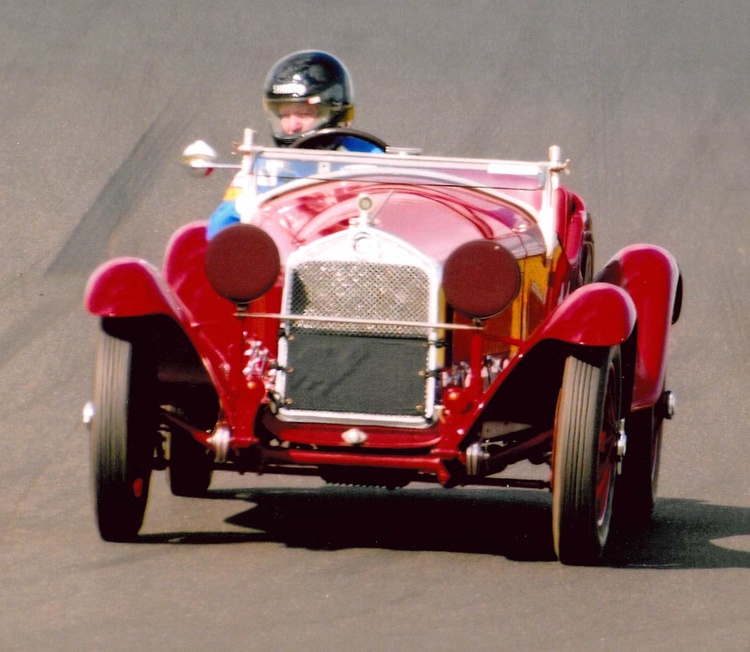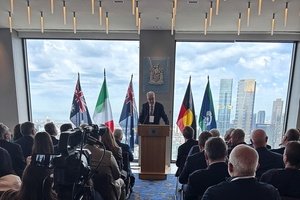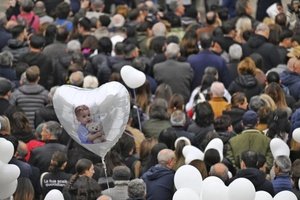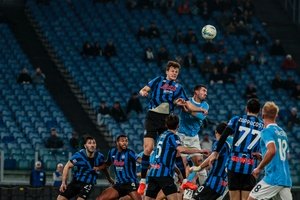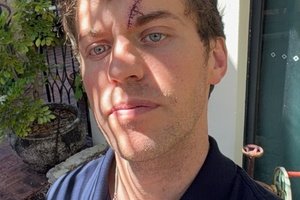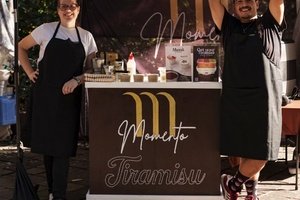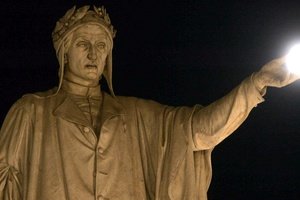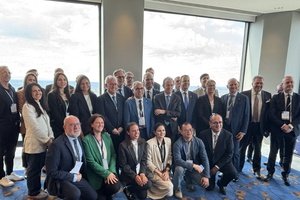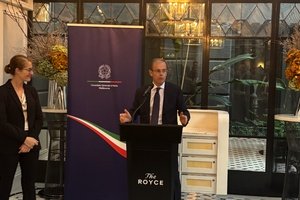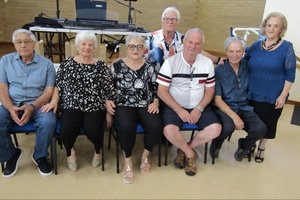MELBOURNE – On September 19, an era truly came to an end. Tarcisio (Terry) Valentino Valmorbida wrote the final word of a remarkable adventure shared by four brothers who left an indelible mark on not just the Italian community, but Australia as a whole.
This isn’t an exaggeration, as Terry’s son Julian mentioned during a brief phone call. Carlo, Mariano, Terry and Saverio played a significant role in changing the culinary habits of the country. They ‘educated’ the palates of Australians and, through bold decisions, paved the way as pioneers in the field of imports while helping to promote ‘Made in Italy’.
From food to cars, motorcycles and everything Italy has to offer, Terry was there. In fact, it was thanks to Terry’s contribution that the story of Il Globo began in Melbourne.
Back in 1959, the young entrepreneur embraced, with genuine enthusiasm and conviction, the proposal of his friend Ubaldo Larobina, who had recently arrived from Italy.
With Terry’s help, Ubaldo was able to bring to life his dream of starting a brand-new Italian newspaper in Melbourne, drawing on his journalistic experience in Rome.
That pivotal moment sets the stage to tell the story of who Terry Valmorbida was: a passionate man committed to every venture he undertook in his long, successful life that was full of achievement and strong family relationships.
His seriousness, determination and ability to foresee opportunities - an essential trait for any successful businessman - allowed him to meet the needs of not only the Italian community but also those of his adopted country.
Ubaldo Larobina, during the 60th anniversary of Il Globo, recalled how their adventure and partnership, built on friendship, began.
“Terry believed strongly in the newspaper, and you could say it all started with a journey,” said Larobina.
“A journey through Victoria and New South Wales, getting to know the Italian community that was spread not only across cities but also in the vast, remote Australian countryside.
“The purpose of that trip was to understand the needs of the community, their aspirations and desires.
“It was one of those road trips that, in your imagination, has the romantic feel of an adventure - perhaps it had a bit of that - but the reality was long stretches of road through Australia. Countless kilometres, lengthy discussions, listening and reflecting.
“Those reflections were never forgotten at Il Globo and the words gathered on that journey became guiding principles for the long life of the newspaper.”
These principles are what Terry followed for years, focusing on the commercial side of the venture. His experience helped drive the success of the newspaper, which was led editorially by Larobina.
Their partnership lasted about a decade, until Terry, seeking new opportunities and challenges, sold his share of the paper to his brothers Carlo, Mariano and Saverio.
We began Terry’s Australian story with his role in the creation of Il Globo, which later became the flagship publication of an entire media group that expanded with the acquisition of La Fiamma, the creation of Rete Italia and, more recently, Il Globo TV.
However, it’s impossible to paint a full picture of Terry without going further back in time to learn the history of the Valmorbidas from Valli del Pasubio in the province of Vicenza.
Specifically, they hailed from the hamlet of Zao, on the right bank of the Leogra River, a small community of a dozen stone houses. Life there revolved around sheep farming and agriculture.
During the harsh winters, women would weave and tend to the home, while the men sought seasonal work in Austria, returning only during the warmer months.
The father of the Valmorbida brothers, Fulvio, married Agnese Corradin, and with the birth of their first son Carlo in 1924, Fulvio began to worry. Seeing no prospects for a prosperous future in Italy for his family, he and his wife concluded that their best chance for success would be to seek their fortune abroad.
So, in April 1925 along with 1124 other compatriots, Fulvio Valmorbida boarded a ship in Genoa bound for Melbourne, in the distant land of Australia.
Upon arrival, he quickly met other migrants from Valli del Pasubio who helped him settle into his new life. The following year, in 1926, he moved to northeastern Victoria, to the Ovens Valley.
From there, Fulvio relocated to the farmlands of Myrtleford to work on a tobacco plantation owned by a wealthy Australian farmer. He was soon joined by Agnese and Carlo, and during their three years in Myrtleford, their second child, Erminia, was born.
At the end of the third year, Fulvio’s hard work paid off with an exceptional harvest, enabling him to plan his return to Italy.
In 1931, he opened a grocery store in Valli del Pasubio before moving shortly after to Ghizzole, closer to Vicenza, where Mariano, Terry, Saverio and Speranza were born.
It was in Ghizzole that the Valmorbida family’s long journey in the food trade, an industry that would prove extremely fruitful for them, began.
All six siblings - Carlo, Erminia, Mariano, Terry, Saverio and Speranza - helped out in the store. But for the younger children’s education, Fulvio and Agnese later moved to Villaganzerla, where they opened a larger shop that supplied restaurants and grocery stores.
After the Second World War, Fulvio began to develop an idea: to open a grocery store in Australia. This plan became a reality in 1949 when his eldest son, Carlo, flew there. The rest of the family followed on the Sebastiano Caboto ship.
A few months after arriving, Carlo began working at Agostino’s, a grocery store established in 1937 by Frank Agostino at 504 Swanston Street. It wasn’t long before Carlo helped get his father and brothers, Mariano (19 at the time) and Terry (15), jobs there as well. Saverio, being younger, was still at school.
This was the beginning of the Valmorbida family’s great adventure, after having learnt all the trade secrets back in Italy.
In 1951, the Valmorbidas decided to purchase Agostino’s, dividing ownership equally between Fulvio and the three eldest sons. Saverio had to wait until 1955 to buy his father’s share and officially join the family business.
With the increasing wave of Italian immigration and the 1956 Melbourne Olympics, Agostino’s success was cemented, playing a key role in promoting Italian cuisine among Australians.
The Valmorbida family was then able to expand, establishing a distribution network throughout metropolitan Melbourne that reached as far as Clayton, Werribee and Frankston.
They also embedded themselves in Melbourne’s Italian community by acquiring the Lygon Food Store, a historic shop at 263 Lygon Street that specialised in high-quality Italian products.
Retail expansion continued with the 1952 opening of a store on Smith Street, Collingwood, followed by four more in Sunshine, Mt Waverley, Noble Park and Reservoir in the following years.
With the federal government aware of the growing demand for Italian products, the Department of Foreign Trade granted the Valmorbida family an import licence.
They introduced Australia to Italian cheeses, cured meats, olive oil, legumes, sardines, anchovies and even Italian cigarettes.
The Valmorbida family’s success was undoubtedly aided by the rapid growth of the Italian population in Australia, leading to the rise of Italian grocery stores. They also helped introduce Italian products into Australia’s supermarket chains.
Business was booming, but that didn’t stop the young Valmorbida brothers from enjoying themselves.
They cruised down Lygon Street in sports cars, organised trips to the snow and the beach, spent evenings in nightclubs and dined aboard Italian ocean liners docked at Melbourne’s port.
They also attended events at Melbourne’s Italian clubs, where the first generation of Italian-Australians mingled, strengthened friendships and forged new business partnerships.
At that time, Terry was a young man of great success, with a keen passion for motorsports. In the mid-1950s, he competed in two Australian Grand Prix events, held at Phillip Island and Albert Park, where he drove his Austin Healey 100S - an exclusive car with cutting-edge technology, considered faster even than the iconic Ferrari.
His passion for motorsports and sports cars followed him throughout his life, becoming somewhat of a collector of designer cars such as Alfa Romeo and Ferrari. At one point, he owned up to 40 models.
He loved speed and aerodynamics, style and high-quality mechanics - whether on four wheels (he owned a De Tomaso and, between 1973 and 1975, became the importer of Modena’s models and the famous Moto Guzzi) or in the air. And above all, he loved his wife Delma, his life’s companion, the girl he married on the 6th of May in 1961. Delma shared his vision and as his life partner she undoubtedly contributed to his success. She remained by Terry’s side to the very end. From their union were born Michael, Daniela, Francesca and Julian.

Terry and Delma few months after their wedding at the Lord Mayor Ball in 1961.
In the early 1970s, after a long six-month holiday touring Europe by car with his young family, Terry got his pilot’s licence and purchased two planes, a Cessna and a Beechcraft.
With these planes he explored Australia, gifting extraordinary experiences to his children. “We flew just about everywhere,” Julian recalled, “and back then, we didn’t need special permits to land in remote areas.”
“We reached untouched, fascinating corners of this vast continent, visiting places where only small Aboriginal communities lived.”
Some had never seen an aeroplane before, and with his adventurous spirit and natural, quiet friendliness, Terry often invited them to experience the thrill of flying.
“It was a wonderful time, full of unique experiences for us kids,” Julian added, speaking for his siblings.
“We were very fortunate.”
The glorious 1970s, post-Il Globo and post-food imports, marked a new phase in Terry’s entrepreneurial journey. Alongside his wife Delma, he delved into property development, focusing on rapidly growing areas such as the Gold Coast and Noosa Heads.
From 1976 to 1983, he shifted his interests and operations to Queensland, returning to Victoria only due to the recession in the early 1980s to launch a new venture.
Once again, with careful planning, Terry made a winning move with AB Commercial, which was born at 79 Lygon Street, East Brunswick. The company specialised in importing and selling catering and refrigeration equipment for industry professionals.
Once again, Terry, through his latest successful venture, showcased the excellence of Made in Italy.
The business was managed directly until 2008, after which a new chapter began with a shift towards stock investments. He was also a silent partner in his son Julian’s financial ventures.
Despite the inevitable passage of time, Terry remained sharp and engaged, even during his final years when health issues forced him into a retirement home on the Mornington Peninsula.
Julian fondly recalled how they regularly went out for lunch and Terry took long walks, often with his beloved grandchildren and a group known as the ‘Wobbly Walkers’.
As much as possible, he continued to live life fully during the last years of an era in which he had played a significant role in the history of both the Italian-Australian community and Australia itself.
Gratitude is owed to a man who, as Julian rightly said, may have been a man of few words, but his personality left a lasting impression in every circumstance.
Those who knew him unanimously agreed on his incredible work ethic - diligent, fair and always willing to lend a hand, accompanied by the sincere generosity that always distinguished him.

